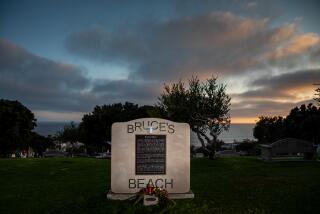Riot Victims File Claims as Prelude to Lawsuits : Recovery: The procedure is necessary before action may be taken against the city, county or state. Officials say a ruling from the Watts unrest holds the government not responsible.
Hundreds of Los Angeles riot victims have begun filing claims against the city, county and state, charging that an inadequate government response was responsible for the injuries and losses they suffered during the violence that swept the city nearly six months ago.
By late Monday, an estimated 1,500 Korean-American and other victims will have filed claims to meet a deadline imposed by California law. Such claims must be lodged before any public entity in the state can be sued.
“If they don’t file these claims they’ll lose the right to sue,” said John Adsit, an attorney who has been working to help the victims as part of a coalition that includes the ACLU Foundation of Southern California and lawyer Gloria Allred. “They feel if the government had done its job, their businesses would not have been destroyed.”
The claims are a preliminary step and do not necessarily mean the victims will eventually file lawsuits, said Stewart Kwoh, director of the Asian Pacific American Legal Center, also part of the coalition. The attorneys are still investigating whether to pursue that course, he said.
On Friday, dozens of victims sat in a Wilshire Boulevard office staffed with volunteers who helped them fill out forms claiming physical or emotional injuries and property damage; other workers took the forms in boxes to the Civic Center. By late Friday, about 500 had been filed with the Los Angeles city clerk and another 300 had been filed with the executive office of the Los Angeles County Board of Supervisors.
“It doesn’t worry me,” said Senior Assistant City Atty. Thomas Hokinson, who heads the unit that will review the claims. “The city of Los Angeles is immune from any liability.”
State law, Hokinson noted, declares that no state or local government entity is responsible for “failure to provide sufficient police protection.”
“This whole issue was addressed in 1969, when the Court of Appeal sustained our position on damage claims arising out of the Watts riots,” Hokinson said.
City records show that after the Watts riots at least 25 merchants or their insurance companies filed lawsuits against the city, county or state. But after the state appellate court dismissed a suit filed by merchants Israel and Ethel Susman, none prevailed.
“The general immunity afforded to the city . . . precludes recovery of damages,” the court ruled.
But this time, said ACLU attorney Robin Toma, “there may be a basis of liability”--particularly in light of the recent Webster Commission findings on the performance of Los Angeles police and city officials.
Kwoh says the claims are a logical follow-up to the Webster report. “This is really the first step in continuing the investigation into why everything broke down,” he said. “The Webster Commission has said it did. We want to find out whether it was more than negligence, whether there was an intent related to a geographic area or racial category.”
The attorney coalition has pulled the victims together as a group, unlike the handling of claims in the 1965 riots.
“Perhaps the biggest difference is the volume, the sheer numbers of complaints from people who felt the police actions were horrendous,” Kwoh said. “What has happened is that many who were personally victimized have come forward and said, ‘We have to do something.’ ”
The claimants include Latinos, Asian-Americans and victims of the violence at Florence and Normandie avenues, one of the early flash points in the riots, Toma said. Among the latter are Latino contractor Fidel Lopez and Takao Hirata, a Japanese-American, who were dragged from their vehicles and beaten.
Simultaneous claims are being filed with the city, county, and state, Adsit said. “It’s unclear who was responsible for what and where,” he said.
Government agencies typically deny such claims. Depending upon the circumstances, victims whose claims are rejected have six months to two years to sue.
At the Wilshire Boulevard victims assistance office, Chan-Jun An, the 55-year-old owner of a South Los Angeles discount store, said he will file a lawsuit if his claim against the city is rejected.
An said he was trapped inside his business for 10 hours as it was looted and set on fire.
“I think the government should compensate us for what we have lost and suffered through no fault of our own,” he said. “I’ve never seen police officers like Los Angeles policemen. As far as I’m concerned the only thing they do is issue traffic tickets. I’m going to pursue this case legally no matter how much time or money it ends up costing me. It is a matter of principle with me.”
More to Read
Sign up for Essential California
The most important California stories and recommendations in your inbox every morning.
You may occasionally receive promotional content from the Los Angeles Times.










![[20060326 (LA/A20) -- STATING THE CASE: Marchers organized by unions, religious organizations and immigrants rights groups carry signs and chant in downtown L.A. "People are really upset that all the work they do, everything that they give to this nation, is ignored," said Angelica Salas of the Coalition of Humane Immigrant Rights. -- PHOTOGRAPHER: Photographs by Gina Ferazzi The Los Angeles Times] *** [Ferazzi, Gina -- - 109170.ME.0325.rights.12.GMF- Gina Ferazzi/Los Angeles Times - Thousands of protesters march to city hall in downtown Los Angeles Saturday, March 25, 2006. They are protesting against House-passed HR 4437, an anti-immigration bill that opponents say will criminalize millions of immigrant families and anyone who comes into contact with them.]](https://ca-times.brightspotcdn.com/dims4/default/34f403d/2147483647/strip/true/crop/1983x1322+109+0/resize/840x560!/quality/75/?url=https%3A%2F%2Fcalifornia-times-brightspot.s3.amazonaws.com%2Fzbk%2Fdamlat_images%2FLA%2FLA_PHOTO_ARCHIVE%2FSDOCS%2854%29%2Fkx3lslnc.JPG)